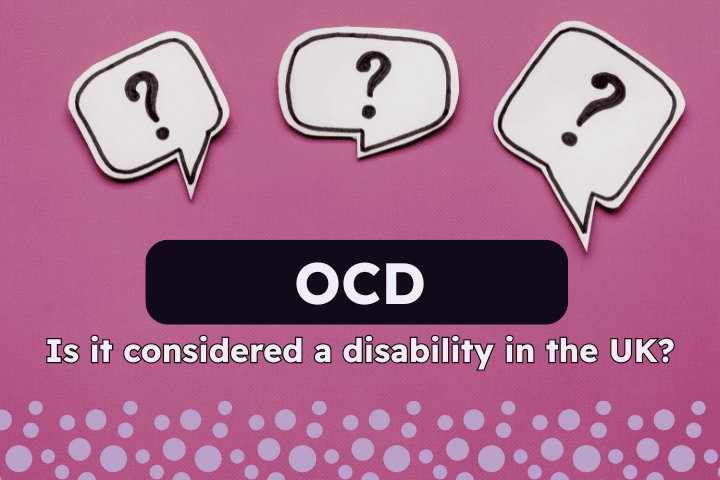All Articles
4 min read
Is OCD considered a Disability in the UK?
Written by
Georgina, Founder of Purpl
Published on
June 27, 2025

Yes – Obsessive Compulsive Disorder (OCD) is legally recognised as a disability in the UK under the Equality Act 2010.
That means if OCD has a significant, long-term effect on your daily life, you have the right to support and reasonable adjustments at work, in education, and beyond.
But like most things, it’s not always black and white, and the reality of living with OCD is often deeply misunderstood.
What is OCD?
OCD is a mental health condition that involves unwanted, intrusive thoughts (obsessions) and repetitive behaviours or mental acts (compulsions) aimed at reducing the distress those thoughts cause.
It’s not about being “a bit tidy” or liking your shelves in a certain order. OCD is a serious, often debilitating condition that can take over someone’s daily life.
Common types of OCD include:
- Contamination OCD – fear of germs, illness, or spreading harm, leading to excessive washing or avoidance
- Checking OCD – repeated checking of locks, appliances, or safety measures
- Intrusive Thoughts – distressing thoughts about harm, sex, or taboo subjects
- Symmetry/Order OCD – needing things to feel “just right” or balanced
- Mental Compulsions – silently repeating phrases, prayers, or counting rituals
Is OCD Considered a Disability in the UK?
Yes. OCD meets the legal definition of a disability under the Equality Act 2010 if it has a long-term, substantial impact on your ability to carry out normal daily activities.
Even if someone appears “high-functioning,” OCD can involve:
- Hours spent managing intrusive thoughts
- Mental exhaustion from compulsions
- Avoidance of social situations, travel, or even work
- Severe anxiety, shame, and distress
It’s not always visible, but it is very real.
How OCD Affects Daily Life
People with OCD often describe it as having a “bully in your brain.” It can affect:
- Getting ready in the morning (rituals, checking)
- Concentration at school or work
- Relationships (fear of harming others, needing reassurance)
- Energy levels and sleep (due to anxiety or rituals)
- Ability to relax or be spontaneous
- Mental health (OCD is linked with depression, anxiety, and suicidal thoughts)
You’re not just “being fussy.” OCD can be genuinely disabling — even if you hide it well.
How is OCD Diagnosed?
Diagnosis is usually done by a GP referral to a mental health professional, often through:
- NHS Talking Therapies (e.g., IAPT services)
- CAMHS (for children)
- Private assessments
Assessment may involve:
- A clinical interview
- Questionnaires like the Y-BOCS (Yale-Brown Obsessive Compulsive Scale)
- A discussion of how symptoms affect daily life
OCD is often misdiagnosed or dismissed, especially if someone is masking well or feels too ashamed to talk about intrusive thoughts.
Treatment and Medication
Effective treatments for OCD include:
- CBT (Cognitive Behavioural Therapy) with ERP (Exposure and Response Prevention) – the gold standard treatment
- SSRIs (like fluoxetine or sertraline) – medications that help reduce the intensity of obsessions and compulsions
Not everyone responds the same way to treatment, and relapses can happen, but support is out there, and recovery is possible.
OCD in Education and the Workplace
In school or uni, OCD can impact:
- Attendance (due to rituals or anxiety)
- Focus in class or exams
- Social interaction or group work
- Energy and mental load
Students may be entitled to:
- Individual support plans or EHCPs
- Extra time in exams
- DSA (Disabled Students’ Allowance) for mentoring or software
At work, OCD can affect:
- Productivity and deadlines
- Meetings or teamwork
- Interactions with colleagues
- Burnout from masking or over-preparing
Under the Equality Act, you’re entitled to reasonable adjustments, such as:
- Flexible working hours or breaks
- Quiet spaces
- Mental health support or job coaching
- Access to Work funding
Emotional Impact and Misconceptions
One of the hardest parts of OCD? The shame and misunderstanding.
People with OCD may struggle with:
- Guilt over intrusive thoughts (especially around taboo topics)
- Fear of being judged or misunderstood
- Hiding rituals or compulsions in public
- Feeling “crazy” or broken
- Exhaustion from constant mental battling
OCD is not a personality quirk. It’s not “just being neat.” It’s a painful, sometimes paralysing condition — and people living with it deserve compassion and support, not jokes or judgement.
What Can You Claim?
If OCD significantly impacts your life, you might be eligible for:
- PIP (Personal Independence Payment) – to help with daily living or mobility needs
- Access to Work – funding for workplace support
- DSA (Disabled Students’ Allowance) – for support in higher education
- EHCPs – for children and teens in school
- Free prescriptions or mental health services – depending on location
Support isn’t just for when you’re “really struggling.” If OCD affects your life, even in ways you’ve learned to cope with, you still deserve help.
Where to Get Support
UK-based organisations offering help include:
- OCD-UK
- OCD Action
- Mind and Rethink Mental Illness
- NHS Talking Therapies
- Local IAPT services or CAMHS (for young people)
- Online communities
Final Thought
OCD is a disability in the UK. It creates real, ongoing barriers in a world that doesn’t always understand.
If you live with OCD, you’re not weak, dramatic, or broken.
You’re dealing with a loud, persistent condition that affects every part of your life — and you’re doing your best.
You have rights. You deserve support. And you are not alone.

Leona’s passionate about accessibility, chronic illness advocacy, and shining a light on hidden disabilities and the stigma surrounding them. Drawing from her personal experiences, she openly discusses the unique struggles faced by people whose disabilities aren’t always visible, aiming to foster understanding, break down misconceptions, and ensure everyone feels seen and validated.
Other articles you might like:
